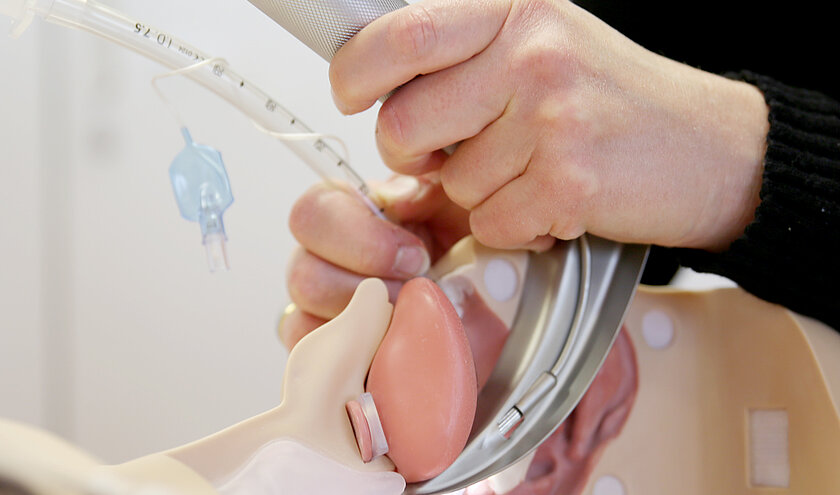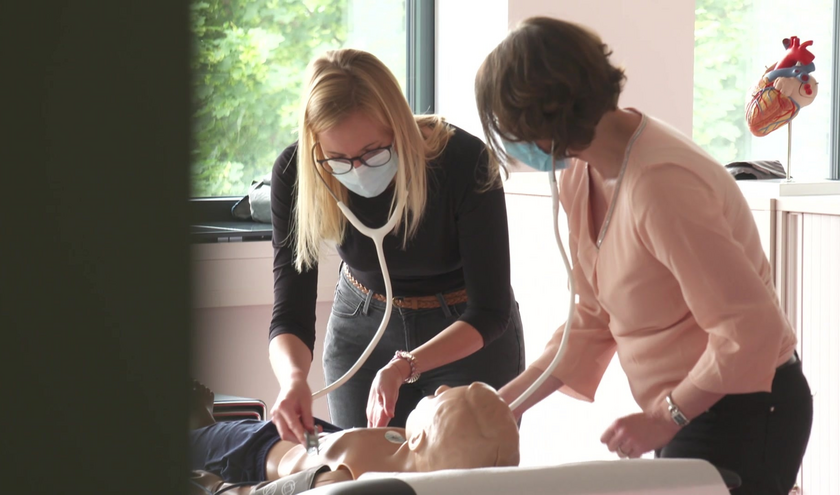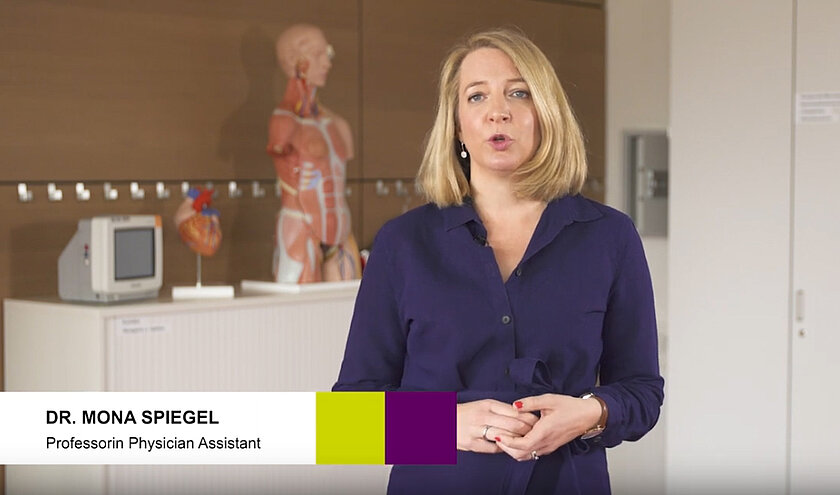Physician Assistant (BSc)
Your future in medicine: become a Physician Assistant!
The medical world is changing rapidly - be a part of it! As a Physician Assistant, you will work hand in hand with doctors and take on responsible tasks in patient care.
Our practical degree programme prepares you perfectly for this exciting profession. You will learn practical skills in the state-of-the-art DocLab and gain valuable practical experience from the 3rd semester onwards.
The Physician Assistant is a relatively new profession in Germany and is recognised by the German Medical Association and the National Association of Statutory Health Insurance Physicians. This profession has long been established abroad.
Admission and application
Admission requirements
- At least advanced technical college entrance qualification (valid in Bavaria)
- With at least 3 years of work experience after completion of the training, "studies without Abi" is also possible
- For international applicants: German C1
- The degree programme has (local) admission restrictions, under certain circumstances, this may result in an Numerus Clausus
- Grade improvement possible with completed healthcare training
Application period
Winter semester: 02.05. – 15.07.
Summer semester: 15.11. – 15.01.
About the programme
Contents of the degree programme
The programme is divided into four content areas:
Natural science basics
- Physics, chemistry, biology, terminology
- Anatomy, physiology, pathology/pathophysiology
- Pharmacology, toxicology
- Microbiology, hygiene
Clinical medicine
- Anamnesis, physical examination Examination, diagnostics
- Operating theatre teaching, medical assistance
- Internal medicine
- Surgery, orthopaedics, trauma surgery
- Neurology, psychiatry and minor subjects
- Emergency medicine (incl. special pharmaceuticals), emergency room management
- Anaesthesiology/ intensive care medicine
- Cardiovascular/thoracic surgery
- Medical ethics
General conditions of clinical activity
- Law
- Medical technology, medical devices and materials
- Social medicine and public health
- Medical information systems
- Medical Controlling
- Management of health care facilities
- Quality and risk management, process management
Methods and key qualifications
- Medical communication
- Team development, conflict management
- Scientific work, methods of empirical social research
- Clinical studies, statistics
- Project management
- Bachelor thesis & seminar
Structure of the degree programme
The degree programme is divided into three phases: the basic studies (semesters 1-2), the main studies (semesters 3-5), and the practical phase, which includes the Bachelor's thesis and the practical semesters.
Semester 1-2:
- Natural science and medical basics
- Pharmacology, toxicology, pathology and pathophysiology
- Medical communication
Semester 3-5:
- Surgery, orthopaedics, trauma surgery, internal medicine, emergency medicine, neurology, psychiatry, gynaecology, urology, geriatrics, cardiovascular-thoracic surgery
- Medical law & ethics, data protection
- Medical technology, medical information systems, e-health
- Project and process management
- Clinical traineeships: internal medicine, surgery
Semester 6:
- Bachelor thesis
- Medical Controlling
- Elective modules
Semester 7-8:
- Practical year (can be shortened to 6 months in case of vocational training in the health care system)
Special features
- This degree programme is medical and practice-oriented. Many courses take place in the faculty's own laboratory DocLab, where practical training takes place. This degree programme is suitable for high school graduates as well as academic further education for people who have completed vocational training in the healthcare sector.
- Physician assistants are part of the medical team and perform demanding tasks. This makes this degree programme a real alternative to studying medicine.
- The profession of Physician Assistant has long been established abroad. The German degree is recognised abroad and this profession can thus also be practised abroad.
- The standard period of study is 8 semesters, of which the last two semesters are spent on the practical year. Students with training in the health system can apply for a reduction of the practical year to 6 months. The study period is then reduced to 7 semesters.
Career perspectives
The physician assistant takes over medical activities. Physician assistants are already being used today in the fields of:
- Patient care
- Anamnesis, status assessment, preparation of diagnosis and treatment plan
- Rounds
- Diagnostics (e.g. endoscopy, sonography, ...)
- Wound care, emergency treatment
- Assistance during operations
- Management of processes, ward procedures, organisation of admissions and discharges, preparation of rehabilitation and AHB applications, use in operating theatre management
- Coordination of therapeutic teams
- Communication
- Documentation and certification
Internships and stays abroad
- This degree programme is very practically oriented. Many courses are held with laboratory participation, so that practical skills can be practised and trained right from the start. A first medical internship, the clinical traineeship in internal medicine, is already planned in the 3rd semester. This is completed in a hospital during the semester. In this way, students are integrated into clinical patient care at an early stage. Another medical internship, the elective surgery, is completed in the 4th semester.
- The 7th and 8th semesters are specified as practical years. These are performed in a medical care facility such as a hospital. Students who have already completed professional training in the healthcare sector can apply for a reduction of the practical phase to 6 months.
- In addition, additional in-depth practical units can be completed in the practical institution during the lecture-free period in accordance with the concept of study with in-depth practice.
- Stays abroad are not compulsory, but are recommended and supported by the faculty and the Neu-Ulm University of Applied Sciences. A semester abroad, the completion of an internship, but also shorter stays such as short internships, language courses, or summer or winter schools are possible. Preparatory courses from the wide range of languages offered by the Language Centre can be taken from the 2nd semester onwards.
Cooperations
Cooperation partners for the university internship as well as for the university internship with in-depth practice include:
- Günzburg-Krumbach district clinics
- Burgau Therapy Centre
- RKU - University and Rehabilitation Clinics Ulm
- Alb Fils Clinics
- Rems-Murr Clinics
- Ulm University Hospital
- University Hospital Tübingen
- Dillingen-Wertingen District Hospital
- Specialist Hospital Ichenhausen
- Ortenau Clinic Lahr
- Clinics of the Sisters of Mercy, Munich
- SINOVA Schussental, Psychosomatic Centre Aulendorf
- Internal Medicine/Surgery MVZ Neu-Ulm
- Diak Clinic Schwäbisch Hall
- Danube Clinic Neu-Ulm
- Crailsheim Hospital
For further information, please contact the student advisory service.
Numerus Clausus (NC)
| Semester | "Abitur" or other entrance qualifications for higher education | Cerificate from a "Fachoberschule" (FOS) or "Berufsoberschule" (BOS) |
|---|---|---|
| winter 24/25 | 2,1 | 2,3 |
| summer 2024 | 2,7 | 3,1 |
| winter 23/24 | 1,9 | 2,1 |
| summer 2023 | 2,4 | 2,8 |
| winter 22/23 | 2,0 | 2,2 |
| summer 2022 | no admission restrictions | no admission restrictions |
Language of instruction
The language of instruction in this degree programme is German. Occasionally, lectures may be held in English, e.g. when using guest lecturers from abroad.
Contributions and fees
There are no tuition fees. A semester fee (administrative fees and solidarity fee) is charged per semester. Information on this can be found on the page "HNU - Fees and Re-registration (opens in a new window)".
Contact
All study documents
Curriculums
Module handbooks
Study and examination regulations
- Study and Examination Regulations (start of studies from WS 2022/23) (in the version of 09.02.2023) (DE)
(opens in a new window)Studien- und Prüfungsordnung (Studienbeginn ab WS 2022/23), in der Fassung vom 15.05.2024 - Kurzuebersicht_PHA.pdf
(opens in a new window) - PHA PO 20201.pdf
(opens in a new window)













